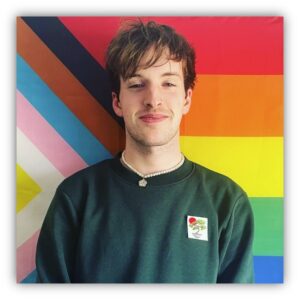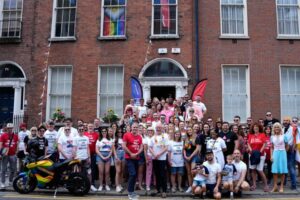My name is David Comer and I’m a SPHeRE Scholar based in the University of Galway, Ireland. My health psychology PhD focuses on the delivery of a medication called HIV PrEP – short for pre-exposure prophylaxis – that can be taken by people who don’t have HIV to prevent the acquisition of HIV from others. Specifically, I’m exploring the experiences gay, bisexual, and other men who have sex with men (gbMSM) have with the Irish PrEP Programme, which provides free PrEP medication and support to those at risk of infection. Broadly, I’m also interested in health inequalities and inequities, sexual health, and critical perspectives on health.
As a SPHeRE scholar, I was provided the opportunity to conduct an Irish national placement to support my learning through my PhD. Given my PhD focuses on the sexual health of gbMSM, my options included:
- a relevant health service (e.g., The Gay Men’s Health Service) to better understand PrEP delivery in clinics.
- a relevant health policy unit (e.g., the HSE Sexual Health and Crisis Pregnancy Centre) to better understand how policies governing and informing PrEP delivery come about.
- a relevant community organisation (e.g., HIV Ireland) to understand the way these organisations collaborate with affected gbMSM and the needs they address.
- a research group that focused on minority sexual health or used a method I was interested in learning.
The MPOWER Programme at HIV Ireland

My MPOWER team headshot, taken in their Dublin office in April 2023
gbMSM face unique challenges in accessing appropriate sexual health care in comparison to sexual majority peers, including issues of stigma, anonymity, and a lack of LGBTQ+ cultural competence from providers. As such, communities of gbMSM benefit from alternative methods of accessing care and support for their health. The HSE-funded MPOWER programme at HIV Ireland provides peer-driven community level interventions to support the sexual health and wellbeing of gbMSM. They also engage in advocacy and are a leading voice for communities of gbMSM in Dublin and beyond. I conducted my placement with the MPOWER programme at HIV Ireland for lots of reasons, including:
- the chance to gain experience outside academic research settings.
- the opportunity to contribute meaningful work to an NGO with limited resources.
- my admiration for MPOWER’s work and the invaluable service they provide to queer men in Ireland.
- the potential benefits of establishing a relationship with a community leader like MPOWER for my PhD.
- previous collaboration with MPOWER programme manager Adam Shanley, who ultimately served as my placement supervisor.
The Day-to-Day
My work with MPOWER officially began in April and ran to the end of June 2023. On my first morning, Iarnród Éireann decided a broken level crossing signal would be a great introduction to the placement. When I finally made the journey from Galway to Dublin, travelled from Houston to the HIV Ireland offices in Phibsborough, and struggled up four flights of stairs, I was only about two hours late – thankfully, Adam was a forgiving supervisor. I sorted accommodation in Drumcondra for most of the placement and, where possible, I travelled the evening prior to attending the office. I aimed to be in the office 1-2 days per week for the duration of my placement and usually arrived around 09:30, worked until 13:30 before grabbing a wrap in Spar, and left around 16:30 to continue my work on the train back to Galway.
The Work…
MPOWER collect lots of monitoring and evaluation data for the services they deliver, but are limited in the resources they can divert to analysing this data – that’s where I came in. MPOWER delivers outreach services online and via dating apps, rapid HIV-testing in venues, and HIV self-testing kits via mail. The data covering their interventions spanned three years (2020 to 2022) and included monitoring data reported by the MPOWER outreach team and feedback provided by service users. I was tasked with collating this data and mapping it onto the MPOWER theory of change and logic model, which was published in 2019 (1). This model outlines key outcomes for the MPOWER programme which had not been evaluated to this point.
Doing justice to the work of MPOWER was a major task, and the report (which is still being drafted) spans over 70 pages and synthesises 134 files. In addition to the MPOWER intervention data, the report now includes input from Adam Shanley on MPOWER’s other activities and detail contextualising MPOWER’s work with scientific literature. I’m hoping to have the full report, along with an executive summary (I wrote the report and even I don’t want to read it all!), available before the end of this year. The report should provide funders with a useful insight into the impact of MPOWER’s work; help staff and the massive team of MPOWER volunteers understand all they’ve achieved and where they can go from here; and allow community members to better understand where they fit into MPOWER’s efforts.
… & Everything Else

Group photo of those attending HIV Ireland’s Pride Breakfast prior to the Dublin Pride Parade in June 2023.
Outside of the data analysis I conducted, Adam and the rest of the team at HIV Ireland facilitated my contributing to lots of other activities. I joined the MPOWER team meeting each week, where the staff provided updates on ongoing projects, upcoming events, and outreach workers discussed case studies of notable outreach interactions. I joined the HIV Ireland Pride organising committee, attended HIV Ireland research meetings, and attended the launch of Dublin Pride in Dublin City Hall. My placement culminated with the Dublin Pride celebrations on June 24th, 2023. I attended HIV Ireland’s annual Pride breakfast, bumped into Minister for Health Stephen Donnelly, and was privileged to walk in the parade alongside MPOWER, HIV Ireland, and the thousands of others that dressed Dublin in colour.
Need to contact MPOWER?
MPOWER provides sex-positive, judgement-free services at no cost. You can speak to their team about STIs, consent, sexuality, and other sexual health and wellbeing needs. They also facilitate referrals to sexual health clinics and counsellors if needed.
They are available by phone, email, Whatsapp, Zoom, and in person. You can contact them by:
- phoning 01-8733799 and asking for the MPOWER team (Mon-Fri, 10am-5pm)
- Whatsapp them at 086 065 7212 (Davy), 086 600 2996 (Mark), or 089 229 1869 (Diego).
- Email them at mpower@hivireland.com
- Send a message via the form on their website (https://mpower.hivireland.ie/speak-to-our-team/)
Explore their online presence via:
- Their website (https://mpower.hivireland.ie/)
- Their Instagram (@mpowerprogramme)
- Their Facebook (MPOWER Programme)
References
- Witzel TC. Theory of Change and Logic Model for an Outreach Programme for Gay, Bisexual and Other Men Who Have Sex with Men [Internet]. HSE Sexual Health & Crisis Pregnancy Programme; 2019 Dec [cited 2023 Jun 21]. Available from: https://www.hivireland.ie/wp-content/uploads/MSM-Programme-Outreach-Theory-of-Change-and-Logic-Model.pdf

